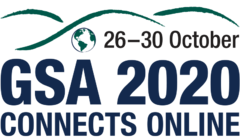GS to Add Early Career Members to its Board of Directors
July 26, 2021
Students, postdoctoral scholars, and other early career scientists form a crucial segment of the Geochemical Society's membership. To make sure that we consider the needs of this population, the society is adding two new seats on its board specifically for early career researchers (ECR). The board is responsible for governing the organization and determining how our programs can best serve the international geochemistry community. Serving on the board is an opportunity to develop as a leader, meet colleagues from around the world, and make a real contribution to the society and larger community.
Early career scientists may self-nominate or be nominated by others for this role by August 20, 2021.
Ross Taylor (1925-2021)
May 24, 2021
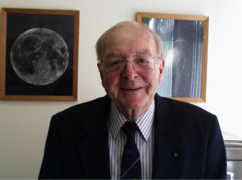
Stuart Ross Taylor, Goldschmidt Medalist (1993) and Geochemistry Fellow, passed away in Canberra, Australia on May 23, 2021, surrounded by family. Ross was a geochemist who made seminal contributions to our understanding of the origin and evolution of Earth's continental crust, and the composition and origin of the Moon, meteorites, tektites, and the solar system. Born in Ashburton, New Zealand in 1925, he received a BSc and MSc Hons from the University of New Zealand followed by a PhD in 1954 at the University of Indiana, USA, where he studied under fellow Kiwi Brian Mason. Taylor was Mason's only PhD student and Mason himself was the last PhD student of Victor Moritz Goldschmidt. Following his PhD, Ross became a tenured lecturer at Oxford University where he worked with Louis Ahrens and built an emission spectroscopy laboratory. There he met Noël, the love of his life, who was working on organic crystallography with Dorothy Hodgkin. They married in 1958 just before Ross accepted an appointment as a senior lecturer in geochemistry at the University of Cape Town, South Africa, where he began his work on the origin of tektites, mysterious glassy droplets found strewn over large regions of Earth. In 1961 he was recruited by John Jaeger to the ANU as a senior fellow in geophysics and in 1962 became a professorial fellow in the Research School of Earth Sciences where he spent the remainder of his career. At ANU he set up an emission spectrograph and later a spark-source mass spectrometer to analyze trace elements at unprecedented detection levels and precision. There he continued his work on tektites, establishing that they are terrestrial in origin and generated at meteorite impact sites. Shortly thereafter, Ross was invited to join the preliminary analysis team for the Apollo 11 and 12 missions and he produced the first geochemical analyses of lunar return samples. Ross went on to become a world expert on lunar composition and origin. He also focused his spectrometers on terrestrial samples such as andesites and sedimentary rocks, developing the andesite model for crustal origin and defining the composition of the upper continental crust through the analyses of terrigenous sediments (shales and loess). Over his prolific career Ross published more than 240 papers and nine books. He received a myriad of honors, including the Goldschmidt Award of the Geochemical Society, the Leonard Medal of the Meteoritical Society, the Bucher Medal from the American Geophysical Union, election to Australian Academy of Sciences, foreign associate of the US National Academy of Sciences, Companion of the Order of Australia, and the naming of asteroid 5670 Rosstaylor. Despite these lofty accomplishments, Ross was always humble and kind and widely loved by his students, post-docs, and colleagues. A student of history, he always had interesting historical anecdotes to share, as anyone who has read the footnotes in his books will know. Ross is survived by his wife of 63 years, Noël Taylor, daughters Judith, Susanna, and Helen, grandson Angelo, and son-in-law Michael.
Roberta L. Rudnick, UC Santa Barbara
Dates Announced for Upcoming Goldschmidt Conferences
May 06, 2021
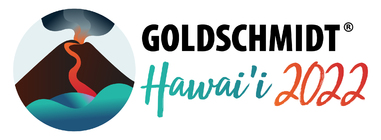
The GS and EAG are pleased to announce that the 2022 Goldschmidt Conference will take place in Honolulu, Hawaiʻi, USA and online from July 10-15. This follows the cancellation of the in-person meeting originally scheduled in Honolulu last year. Plans were well underway for field trips, workshops, and social events to give delegates opportunities to explore the geology and culture of the Aloha State. Many of these events will now take place during next year's meeting. Hybrid components will provide remote participation options, as well.
Dates for the following conferences are also confirmed:
- July 9-14, 2023 • Location to be determined
- August 18-25, 2024 • Chicago, Illinois, USA
Elements: Shedding Light on the European Alps
May 06, 2021
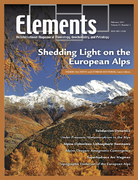
The European Alps are one of the most studied orogens worldwide. New research has brought into question long-established paradigms of Alpine evolution. This issue provides a petrological, geochemical, and tectonic overview of the Alpine orogeny, from rifting and spreading to subduction and collision and, finally, to postcollisional uplift and erosion. Also discussed are the current debates regarding the origins of (ultra-)high pressure metamorphism, the origins of syncollisional magmatism, and the evolution of rifting and ocean spreading.
Current Geochemical Society members can access this issue now via the Elements website using your email address (UserID) and member number (Password).
Günter W. Lugmair (1940-2021)
April 20, 2021
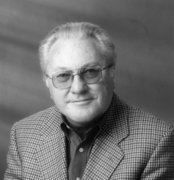
Cosmophysicist Günter W. Lugmair passed away on March 31. He received the Geochemical Society's V. M. Goldschmidt Award in 2007. It was one of many honors that he received over the course of a distinguished career.
Elements: Hydrothermal Fluids
February 18, 2021
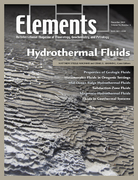
Fluids transfer heat and mass in the Earth. This issue explores the physical and chemical properties of hydrothermal fluids and how they affect geologic processes. The nature of hydrothermal fluids across a range of geologic settings; the interactions between fluids and rocks; and the interrelationships between fluid-driven processes in different settings are explored. Each article highlights both broad and specific overlaps between "normal" and ore-forming hydrothermal fluids and describes how the features of hydrothermal systems reflect the specific properties of fluids in different settings.
Current Geochemical Society members can access this issue now via the Elements website using your email address (UserID) and member number (Password).
Call for Nominations: Goldschmidt Special Lectures
December 10, 2020
The GS is seeking nominations from the community for three lectures to be presented next July at Goldschmidt2021. The F. Earl Ingerson Lecture is open to any geochemical topic with broad appeal. The Endowed Biogeochemistry Lecture recognizes a prominent scientist who is making cutting-edge field-based measurements or laboratory measurements on field samples in biogeochemistry. The lecture honoring Robert Berner (presented jointly with EAG) includes a wide range of topics associated with elemental cycling at the Earth's surface. The nominations deadline for all three lectures is Jan. 8, 2021.
Learn more about the Berner Lecture
Learn more about the Endowed Biogeochemistry Lecture
Learn more about the Ingerson Lecture

Town Hall: Mentoring in Geochemistry
November 18, 2020
The Geochemical Society is pleased to announce our second town hall on diversity, equity, and inclusion (DEI) topics: Mentoring in Geochemistry--A tool for creating more inclusive and equitable environments. Join us on Thursday, December 3 from 4:00 - 5:30pm EST for an online discussion open to the entire geochemistry community. Learn more
Elements: Noble Gas Thermochronology
October 26, 2020
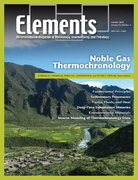
Noble-gas thermochronology takes advantage of (1) the time-dependent production of noble gases and (2) the thermally activated diffusion of these gases in minerals to constrain the temperature histories of crustal rocks. This issue highlights how noble-gas thermochronology has been used to address questions across Earth and planetary science, as well as what new avenues of research noble-gas thermochronology could be used for in the future.
Current Geochemical Society members can access this issue now via the Elements website using your email address (UserID) and member number (Password).
Member Registration for GSA and AGU
August 21, 2020
Geochemical Society members receive the discounted member registration rates for both the GSA 2020 Connects Online and the AGU Fall Meeting. Your GS member number/customer ID is required to receive the discounted rates. You can find your 6-digit number in your online profile. You can also contact the business office for assistance.
